Deck 9: Games and Strategic Behavior
Question
Question
Question
Question
Question
Question
Question
Question
Question
Question
Question
Question
Question
Question
Question
Question
Question
Question
Question
Question
Question
Question
Question
Question
Question
Question
Question
Question
Question
Question
Question
Question
Question
Question
Question
Question
Question
Question
Question
Question
Question
Question
Question
Question
Question
Question
Question
Question
Question
Question
Question
Question
Question
Question
Question
Question
Question
Question
Question
Question
Question
Question
Question
Question
Question
Question
Question
Question
Question
Question
Question
Question
Question
Question
Question
Question
Question
Question
Question
Question

Unlock Deck
Sign up to unlock the cards in this deck!
Unlock Deck
Unlock Deck
1/150
Play
Full screen (f)
Deck 9: Games and Strategic Behavior
1
Refer to the figure below. In this game, the dominated strategy for Player A: 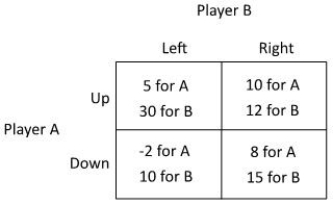
A)is to play up.
B)is to cooperate with Player B.
C)is to play down.
D)will depend on Player B's move.

A)is to play up.
B)is to cooperate with Player B.
C)is to play down.
D)will depend on Player B's move.
is to play down.
2
Joe is the owner of the 7-11 Mini Mart, Sam is the owner of the SuperAmerica Mini Mart, and together they are the only two gas stations in town. Currently, they both charge $3 per gallon, and each earns a profit of $1,000. If Joe cuts his price to $2.90 and Sam continues to charge $3, then Joe's profit will be $1,350, and Sam's profit will be $500. Similarly, if Sam cuts his price to $2.90 and Joe continues to charge $3, then Sam's profit will be $1,350, and Joe's profit will be $500. If Sam and Joe both cut their price to $2.90, then they will each earn a profit of $900. For both Joe and Sam, ________ is a ________.
A)cutting the price to $2.90; dominated strategy
B)leaving the price at $3; Nash equilibrium
C)leaving the price at $3; dominant strategy
D)cutting the price to $2.90; dominant strategy
A)cutting the price to $2.90; dominated strategy
B)leaving the price at $3; Nash equilibrium
C)leaving the price at $3; dominant strategy
D)cutting the price to $2.90; dominant strategy
cutting the price to $2.90; dominant strategy
3
Refer to the figure below. If Jess chooses A, then Cory's best response is:
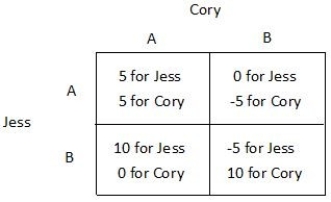
A)non-existent.
B)to choose A.
C)to choose B.
D)to choose the cell in which Cory's payoff is 10.

A)non-existent.
B)to choose A.
C)to choose B.
D)to choose the cell in which Cory's payoff is 10.
to choose A.
4
Joe is the owner of the 7-11 Mini Mart, Sam is the owner of the SuperAmerica Mini Mart, and together they are the only two gas stations in town. Currently, they both charge $3 per gallon, and each earns a profit of $1,000. If Joe cuts his price to $2.90 and Sam continues to charge $3, then Joe's profit will be $1,350, and Sam's profit will be $500. Similarly, if Sam cuts his price to $2.90 and Joe continues to charge $3, then Sam's profit will be $1,350, and Joe's profit will be $500. If Sam and Joe both cut their price to $2.90, then they will each earn a profit of $900. The clear outcome of this game is that:
A)Joe will cut his price and Sam won't.
B)both Joe and Sam will cut their price.
C)Sam will cut his price and Joe won't.
D)neither Joe nor Sam will cut his price.
A)Joe will cut his price and Sam won't.
B)both Joe and Sam will cut their price.
C)Sam will cut his price and Joe won't.
D)neither Joe nor Sam will cut his price.

Unlock Deck
Unlock for access to all 150 flashcards in this deck.
Unlock Deck
k this deck
5
Refer to the figure below. In the matrix above:
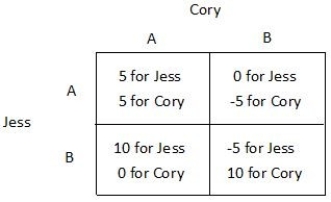
A)Jess has a dominant strategy, but Cory does not.
B)Cory has a dominant strategy, but Jess does not.
C)both Cory and Jess have the same dominant strategy.
D)neither Cory nor Jess has a dominant strategy.

A)Jess has a dominant strategy, but Cory does not.
B)Cory has a dominant strategy, but Jess does not.
C)both Cory and Jess have the same dominant strategy.
D)neither Cory nor Jess has a dominant strategy.

Unlock Deck
Unlock for access to all 150 flashcards in this deck.
Unlock Deck
k this deck
6
Refer to the figure below. What is the Nash equilibrium of this game? 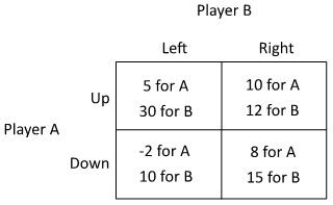
A)A chooses Up, B chooses Right
B)A chooses Up, B chooses Left
C)A chooses Down, B chooses Right
D)A chooses Down, B chooses Left

A)A chooses Up, B chooses Right
B)A chooses Up, B chooses Left
C)A chooses Down, B chooses Right
D)A chooses Down, B chooses Left

Unlock Deck
Unlock for access to all 150 flashcards in this deck.
Unlock Deck
k this deck
7
Refer to the figure below. In this game, how many dominant strategies does Player A have? 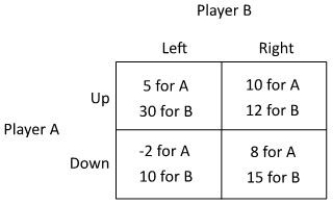
A)0
B)1
C)2
D)4

A)0
B)1
C)2
D)4

Unlock Deck
Unlock for access to all 150 flashcards in this deck.
Unlock Deck
k this deck
8
A payoff matrix shows:
A)the payoff to being a monopolist.
B)the demand curve facing a firm when there are only two firms.
C)the payoffs for each possible combination of strategies.
D)the payoff to being a perfectly competitive firm.
A)the payoff to being a monopolist.
B)the demand curve facing a firm when there are only two firms.
C)the payoffs for each possible combination of strategies.
D)the payoff to being a perfectly competitive firm.

Unlock Deck
Unlock for access to all 150 flashcards in this deck.
Unlock Deck
k this deck
9
Refer to the figure below. Player B can infer that Player A will: 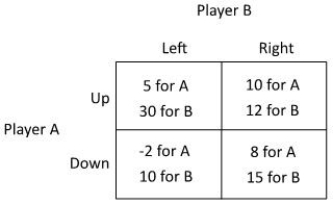
A)always choose Down.
B)always choose Up.
C)choose Down when B chooses Left and choose Up when B chooses Right.
D)choose Up when B chooses Left and Down when B chooses Right.

A)always choose Down.
B)always choose Up.
C)choose Down when B chooses Left and choose Up when B chooses Right.
D)choose Up when B chooses Left and Down when B chooses Right.

Unlock Deck
Unlock for access to all 150 flashcards in this deck.
Unlock Deck
k this deck
10
Joe is the owner of the 7-11 Mini Mart, Sam is the owner of the SuperAmerica Mini Mart, and together they are the only two gas stations in town. Currently, they both charge $3 per gallon, and each earns a profit of $1,000. If Joe cuts his price to $2.90 and Sam continues to charge $3, then Joe's profit will be $1,350, and Sam's profit will be $500. Similarly, if Sam cuts his price to $2.90 and Joe continues to charge $3, then Sam's profit will be $1,350, and Joe's profit will be $500. If Sam and Joe both cut their price to $2.90, then they will each earn a profit of $900. For Sam, cutting his price to $2.90 per gallon is a:
A)revenue-maximizing strategy.
B)dominant strategy.
C)dominated strategy.
D)profit-maximizing strategy.
A)revenue-maximizing strategy.
B)dominant strategy.
C)dominated strategy.
D)profit-maximizing strategy.

Unlock Deck
Unlock for access to all 150 flashcards in this deck.
Unlock Deck
k this deck
11
Refer to the figure below. In this game, how many dominant strategies does Player B have?. 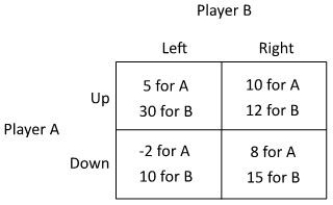
A)0
B)1
C)2
D)4

A)0
B)1
C)2
D)4

Unlock Deck
Unlock for access to all 150 flashcards in this deck.
Unlock Deck
k this deck
12
Game theory is not useful in understanding perfect competition because in a perfectly competitive market:
A)no single firm can influence the market price, so firms' decisions are not interdependent.
B)each firm only cares about its own profit, so there is no interdependence.
C)there are too many firms to be able to model their behavior accurately using game theory.
D)the payoffs to firms' choices are unknown.
A)no single firm can influence the market price, so firms' decisions are not interdependent.
B)each firm only cares about its own profit, so there is no interdependence.
C)there are too many firms to be able to model their behavior accurately using game theory.
D)the payoffs to firms' choices are unknown.

Unlock Deck
Unlock for access to all 150 flashcards in this deck.
Unlock Deck
k this deck
13
A dominant strategy exists if:
A)a player has a strategy that yields the highest payoff regardless of the other player's choice.
B)both players have the highest payoff when they make the same choice.
C)both players make the same choice.
D)one strategy yields the highest possible payoff.
A)a player has a strategy that yields the highest payoff regardless of the other player's choice.
B)both players have the highest payoff when they make the same choice.
C)both players make the same choice.
D)one strategy yields the highest possible payoff.

Unlock Deck
Unlock for access to all 150 flashcards in this deck.
Unlock Deck
k this deck
14
The three elements of a game are:
A)the firm, the consumers, and the profit.
B)the players, the strategies, and the payoffs.
C)the model, the graph, and the costs.
D)the costs, the revenue, and the profit.
A)the firm, the consumers, and the profit.
B)the players, the strategies, and the payoffs.
C)the model, the graph, and the costs.
D)the costs, the revenue, and the profit.

Unlock Deck
Unlock for access to all 150 flashcards in this deck.
Unlock Deck
k this deck
15
Consider the accompanying payoff matrix.
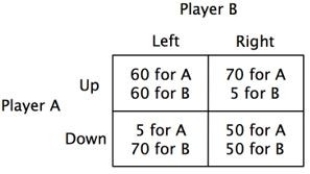 Suppose both players make their choices simultaneously and independently. What is the Nash equilibrium of this game?
Suppose both players make their choices simultaneously and independently. What is the Nash equilibrium of this game?
A)Player A chooses Down and player B chooses Left.
B)Player A chooses Up and player B chooses Right.
C)Player A chooses Up and player B chooses Left.
D)Player A chooses Down and player B chooses Right
 Suppose both players make their choices simultaneously and independently. What is the Nash equilibrium of this game?
Suppose both players make their choices simultaneously and independently. What is the Nash equilibrium of this game?A)Player A chooses Down and player B chooses Left.
B)Player A chooses Up and player B chooses Right.
C)Player A chooses Up and player B chooses Left.
D)Player A chooses Down and player B chooses Right

Unlock Deck
Unlock for access to all 150 flashcards in this deck.
Unlock Deck
k this deck
16
Refer to the figure below. If Cory chooses A, then Jess's best response is:
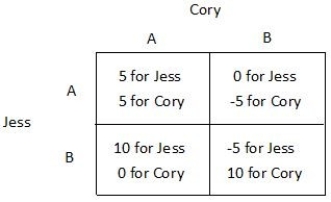
A)non-existent.
B)to choose A.
C)to choose B.
D)to choose the cell in which Jess's payoff is 10

A)non-existent.
B)to choose A.
C)to choose B.
D)to choose the cell in which Jess's payoff is 10

Unlock Deck
Unlock for access to all 150 flashcards in this deck.
Unlock Deck
k this deck
17
Joe is the owner of the 7-11 Mini Mart, Sam is the owner of the SuperAmerica Mini Mart, and together they are the only two gas stations in town. Currently, they both charge $3 per gallon, and each earns a profit of $1,000. If Joe cuts his price to $2.90 and Sam continues to charge $3, then Joe's profit will be $1,350, and Sam's profit will be $500. Similarly, if Sam cuts his price to $2.90 and Joe continues to charge $3, then Sam's profit will be $1,350, and Joe's profit will be $500. If Sam and Joe both cut their price to $2.90, then they will each earn a profit of $900. For Joe, keeping his price at $3 per gallon is a:
A)revenue-maximizing strategy.
B)dominant strategy.
C)dominated strategy.
D)profit-maximizing strategy.
A)revenue-maximizing strategy.
B)dominant strategy.
C)dominated strategy.
D)profit-maximizing strategy.

Unlock Deck
Unlock for access to all 150 flashcards in this deck.
Unlock Deck
k this deck
18
Consider the accompanying payoff matrix.
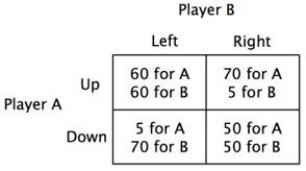 What is player A's dominant strategy?
What is player A's dominant strategy?
A)Up
B)Down
C)Left
D)Right
 What is player A's dominant strategy?
What is player A's dominant strategy?A)Up
B)Down
C)Left
D)Right

Unlock Deck
Unlock for access to all 150 flashcards in this deck.
Unlock Deck
k this deck
19
Game theory provides tools that are used to model:
A)the behavior of perfectly competitive firms.
B)the cost functions faced by firms.
C)consumer demand.
D)strategic interdependencies.
A)the behavior of perfectly competitive firms.
B)the cost functions faced by firms.
C)consumer demand.
D)strategic interdependencies.

Unlock Deck
Unlock for access to all 150 flashcards in this deck.
Unlock Deck
k this deck
20
Refer to the figure below. Player A can infer that Player B will: 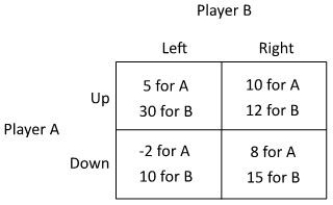
A)choose Left.
B)choose Right.
C)choose Left when A chooses Up and choose Right when A chooses Down.
D)Player A cannot infer anything about what Player B will do given this matrix.

A)choose Left.
B)choose Right.
C)choose Left when A chooses Up and choose Right when A chooses Down.
D)Player A cannot infer anything about what Player B will do given this matrix.

Unlock Deck
Unlock for access to all 150 flashcards in this deck.
Unlock Deck
k this deck
21
The payoff matrix below shows the payoffs (in millions of dollars)for two firms, A and B, for two different strategies, investing in new capital or not investing in new capital.
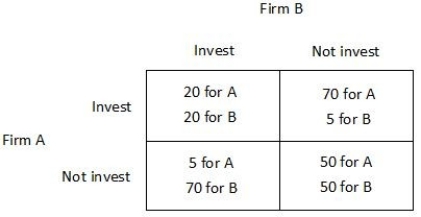 An industry spy from firm A comes to firm B and offers to pay B in exchange for B's certain and enforceable promise to not invest. What is the most that firm A will be willing to pay B to not invest?
An industry spy from firm A comes to firm B and offers to pay B in exchange for B's certain and enforceable promise to not invest. What is the most that firm A will be willing to pay B to not invest?
A)$30 million
B)$20 million
C)$35 million
D)$50 million
 An industry spy from firm A comes to firm B and offers to pay B in exchange for B's certain and enforceable promise to not invest. What is the most that firm A will be willing to pay B to not invest?
An industry spy from firm A comes to firm B and offers to pay B in exchange for B's certain and enforceable promise to not invest. What is the most that firm A will be willing to pay B to not invest?A)$30 million
B)$20 million
C)$35 million
D)$50 million

Unlock Deck
Unlock for access to all 150 flashcards in this deck.
Unlock Deck
k this deck
22
Consider the accompanying payoff matrix. 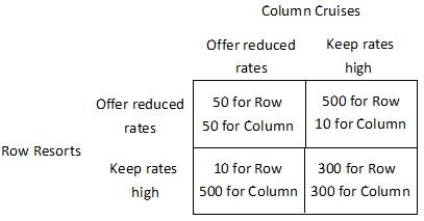 If both firms offer reduced rates, each earns ________, and if both firms keep their rates high, each earns ________.
If both firms offer reduced rates, each earns ________, and if both firms keep their rates high, each earns ________.
A)300; 50
B)50; 300
C)300; 500
D)500; 300
 If both firms offer reduced rates, each earns ________, and if both firms keep their rates high, each earns ________.
If both firms offer reduced rates, each earns ________, and if both firms keep their rates high, each earns ________.A)300; 50
B)50; 300
C)300; 500
D)500; 300

Unlock Deck
Unlock for access to all 150 flashcards in this deck.
Unlock Deck
k this deck
23
Consider the accompanying payoff matrix. 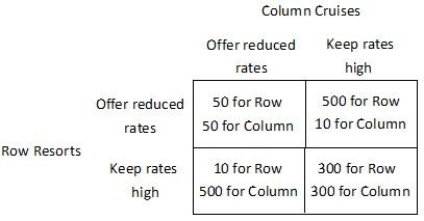 If Column Cruises offers reduced rates, and Row Resorts keeps its rates high, then Row Resorts will earn ________, and Column Cruises will earn ________.
If Column Cruises offers reduced rates, and Row Resorts keeps its rates high, then Row Resorts will earn ________, and Column Cruises will earn ________.
A)300; 300
B)50; 50
C)500; 10
D)10; 500
 If Column Cruises offers reduced rates, and Row Resorts keeps its rates high, then Row Resorts will earn ________, and Column Cruises will earn ________.
If Column Cruises offers reduced rates, and Row Resorts keeps its rates high, then Row Resorts will earn ________, and Column Cruises will earn ________.A)300; 300
B)50; 50
C)500; 10
D)10; 500

Unlock Deck
Unlock for access to all 150 flashcards in this deck.
Unlock Deck
k this deck
24
A game involving two players with two possible strategies is a prisoner's dilemma if each player has a dominant strategy and:
A)neither player plays their dominant strategy.
B)each player's payoff is higher when both play their dominated strategy than when both play their dominant strategy.
C)each player's payoff is higher when both play their dominant strategy than when both play their dominated strategy.
D)there is a Nash equilibrium that yields the highest payoff for both players.
A)neither player plays their dominant strategy.
B)each player's payoff is higher when both play their dominated strategy than when both play their dominant strategy.
C)each player's payoff is higher when both play their dominant strategy than when both play their dominated strategy.
D)there is a Nash equilibrium that yields the highest payoff for both players.

Unlock Deck
Unlock for access to all 150 flashcards in this deck.
Unlock Deck
k this deck
25
A prisoner's dilemma illustrates situations in which:
A)resources with the lowest opportunity cost should be used first.
B)everyone does best when each person specializes in the activities in which he or she has a comparative advantage.
C)efficiency is an important social goal.
D)there is a conflict between the narrow self-interest of individuals and the broader interests of a group.
A)resources with the lowest opportunity cost should be used first.
B)everyone does best when each person specializes in the activities in which he or she has a comparative advantage.
C)efficiency is an important social goal.
D)there is a conflict between the narrow self-interest of individuals and the broader interests of a group.

Unlock Deck
Unlock for access to all 150 flashcards in this deck.
Unlock Deck
k this deck
26
Joe is the owner of the 7-11 Mini Mart, Sam is the owner of the SuperAmerica Mini Mart, and together they are the only two gas stations in town. Currently, they both charge $3 per gallon, and each earns a profit of $1,000. If Joe cuts his price to $2.90 and Sam continues to charge $3, then Joe's profit will be $1,350, and Sam's profit will be $500. Similarly, if Sam cuts his price to $2.90 and Joe continues to charge $3, then Sam's profit will be $1,350, and Joe's profit will be $500. If Sam and Joe both cut their price to $2.90, then they will each earn a profit of $900. If both players choose their dominated strategy they will each earn ________, and if both players choose their dominant strategy they will each earn ________.
A)$500; $1,350
B)$900; $1,350
C)$900; $1,000
D)$1,000; $900
A)$500; $1,350
B)$900; $1,350
C)$900; $1,000
D)$1,000; $900

Unlock Deck
Unlock for access to all 150 flashcards in this deck.
Unlock Deck
k this deck
27
A prisoner's dilemma is a game in which:
A)neither player has a dominant strategy.
B)one player has a dominant strategy and the other does not.
C)the players' payoffs are smaller when both play their dominant strategy compared to when both play a dominated strategy.
D)the players' payoffs are larger when both play their dominant strategy compared to when both play a dominated strategy.
A)neither player has a dominant strategy.
B)one player has a dominant strategy and the other does not.
C)the players' payoffs are smaller when both play their dominant strategy compared to when both play a dominated strategy.
D)the players' payoffs are larger when both play their dominant strategy compared to when both play a dominated strategy.

Unlock Deck
Unlock for access to all 150 flashcards in this deck.
Unlock Deck
k this deck
28
Consider the accompanying payoff matrix. 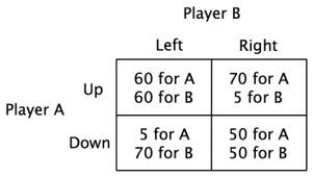 Is this game a prisoner's dilemma?
Is this game a prisoner's dilemma?
A)Yes.
B)No.
C)It's a prisoner's dilemma for player A, but not for player B.
D)It's a prisoner's dilemma for player B, but not for player A.
 Is this game a prisoner's dilemma?
Is this game a prisoner's dilemma?A)Yes.
B)No.
C)It's a prisoner's dilemma for player A, but not for player B.
D)It's a prisoner's dilemma for player B, but not for player A.

Unlock Deck
Unlock for access to all 150 flashcards in this deck.
Unlock Deck
k this deck
29
In the Nash equilibrium of a prisoner's dilemma:
A)there is no cash left on the table.
B)there is unrealized opportunity for both to gain.
C)total economic surplus is maximized.
D)both players have equal payoffs.
A)there is no cash left on the table.
B)there is unrealized opportunity for both to gain.
C)total economic surplus is maximized.
D)both players have equal payoffs.

Unlock Deck
Unlock for access to all 150 flashcards in this deck.
Unlock Deck
k this deck
30
Joe is the owner of the 7-11 Mini Mart, Sam is the owner of the SuperAmerica Mini Mart, and together they are the only two gas stations in town. Currently, they both charge $3 per gallon, and each earns a profit of $1,000. If Joe cuts his price to $2.90 and Sam continues to charge $3, then Joe's profit will be $1,350, and Sam's profit will be $500. Similarly, if Sam cuts his price to $2.90 and Joe continues to charge $3, then Sam's profit will be $1,350, and Joe's profit will be $500. If Sam and Joe both cut their price to $2.90, then they will each earn a profit of $900. In this situation, the Nash equilibrium yields a:
A)lower payoff than each would receive if each played his dominant strategy.
B)higher payoff than each would receive if each played his dominant strategy.
C)lower payoff than each would receive if each played his dominated strategy.
D)the same payoff that each would receive if each played his dominated strategy.
A)lower payoff than each would receive if each played his dominant strategy.
B)higher payoff than each would receive if each played his dominant strategy.
C)lower payoff than each would receive if each played his dominated strategy.
D)the same payoff that each would receive if each played his dominated strategy.

Unlock Deck
Unlock for access to all 150 flashcards in this deck.
Unlock Deck
k this deck
31
Consider the accompanying payoff matrix. 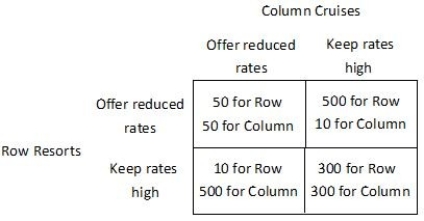 The dominant strategy for Row Resorts is to ________ , and the dominant strategy for Column Cruises is to ________ .
The dominant strategy for Row Resorts is to ________ , and the dominant strategy for Column Cruises is to ________ .
A)keep rates high; keep rates high
B)offer reduced rates; offer reduced rates
C)keep rates high; offer reduced rates
D)offer reduced rates; keep rates high
 The dominant strategy for Row Resorts is to ________ , and the dominant strategy for Column Cruises is to ________ .
The dominant strategy for Row Resorts is to ________ , and the dominant strategy for Column Cruises is to ________ .A)keep rates high; keep rates high
B)offer reduced rates; offer reduced rates
C)keep rates high; offer reduced rates
D)offer reduced rates; keep rates high

Unlock Deck
Unlock for access to all 150 flashcards in this deck.
Unlock Deck
k this deck
32
The reason that the prisoner's dilemma presents a dilemma is that:
A)neither player has a comparative advantage, so neither can infer what the other player will choose.
B)the market cannot be in equilibrium because the players do not have dominant strategies.
C)each player has an incentive to play his or her dominant strategy, but when both choose the dominant strategy each player has a lower payoff than if they both had chosen the dominated strategy.
D)each player has an incentive to play his or her dominated strategy, but when both choose the dominated strategy each player has a lower payoff than if they both had chosen the dominant strategy.
A)neither player has a comparative advantage, so neither can infer what the other player will choose.
B)the market cannot be in equilibrium because the players do not have dominant strategies.
C)each player has an incentive to play his or her dominant strategy, but when both choose the dominant strategy each player has a lower payoff than if they both had chosen the dominated strategy.
D)each player has an incentive to play his or her dominated strategy, but when both choose the dominated strategy each player has a lower payoff than if they both had chosen the dominant strategy.

Unlock Deck
Unlock for access to all 150 flashcards in this deck.
Unlock Deck
k this deck
33
The payoff matrix below shows the payoffs (in millions of dollars)for two firms, A and B, for two different strategies, investing in new capital or not investing in new capital.
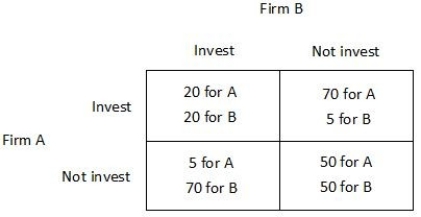 This game is an example of a:
This game is an example of a:
A)cartel.
B)credible promise.
C)prisoner's dilemma.
D)game with multiple equilibria.
 This game is an example of a:
This game is an example of a:A)cartel.
B)credible promise.
C)prisoner's dilemma.
D)game with multiple equilibria.

Unlock Deck
Unlock for access to all 150 flashcards in this deck.
Unlock Deck
k this deck
34
The payoff matrix below shows the payoffs (in millions of dollars)for two firms, A and B, for two different strategies, investing in new capital or not investing in new capital.
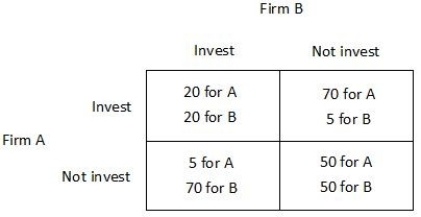 An industry spy comes to firm B and claims to know what firm A has decided. Given that each firm already knows the payoff matrix, how much would this information be worth to firm B?
An industry spy comes to firm B and claims to know what firm A has decided. Given that each firm already knows the payoff matrix, how much would this information be worth to firm B?
A)$0
B)$50 million
C)$30 million
D)$70 million
 An industry spy comes to firm B and claims to know what firm A has decided. Given that each firm already knows the payoff matrix, how much would this information be worth to firm B?
An industry spy comes to firm B and claims to know what firm A has decided. Given that each firm already knows the payoff matrix, how much would this information be worth to firm B?A)$0
B)$50 million
C)$30 million
D)$70 million

Unlock Deck
Unlock for access to all 150 flashcards in this deck.
Unlock Deck
k this deck
35
Consider the accompanying payoff matrix. 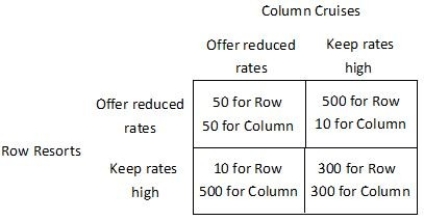 When Row Resorts and Column Cruises both play their dominant strategy:
When Row Resorts and Column Cruises both play their dominant strategy:
A)both firms do better than if they had both played their dominated strategy.
B)Row Resorts earns a higher profit than does Column Cruises.
C)both firms do worse than if they had both played their dominated strategy.
D)Column Cruises earns a higher profit than does Row Resorts.
 When Row Resorts and Column Cruises both play their dominant strategy:
When Row Resorts and Column Cruises both play their dominant strategy:A)both firms do better than if they had both played their dominated strategy.
B)Row Resorts earns a higher profit than does Column Cruises.
C)both firms do worse than if they had both played their dominated strategy.
D)Column Cruises earns a higher profit than does Row Resorts.

Unlock Deck
Unlock for access to all 150 flashcards in this deck.
Unlock Deck
k this deck
36
The payoff matrix below shows the payoffs (in millions of dollars)for two firms, A and B, for two different strategies, investing in new capital or not investing in new capital.
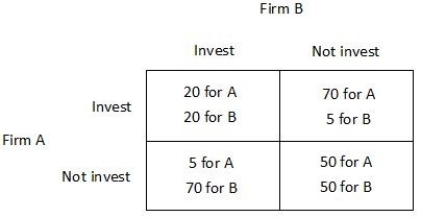 An industry spy comes to firm B and offers to pay B in exchange for B's certain and enforceable promise to not invest. How much must the spy pay B?
An industry spy comes to firm B and offers to pay B in exchange for B's certain and enforceable promise to not invest. How much must the spy pay B?
A)$0
B)At least $15 million
C)At least $35 million
D)At least $50 million
 An industry spy comes to firm B and offers to pay B in exchange for B's certain and enforceable promise to not invest. How much must the spy pay B?
An industry spy comes to firm B and offers to pay B in exchange for B's certain and enforceable promise to not invest. How much must the spy pay B?A)$0
B)At least $15 million
C)At least $35 million
D)At least $50 million

Unlock Deck
Unlock for access to all 150 flashcards in this deck.
Unlock Deck
k this deck
37
The dilemma in a prisoner's dilemma is that:
A)the outcome is random, so players are uncertain about which strategy to play.
B)only one player has a dominant strategy, but the other player is uncertain about what to do.
C)the players would be better off if they both played a dominated strategy.
D)the players may be trapped in a game they don't know how to play.
A)the outcome is random, so players are uncertain about which strategy to play.
B)only one player has a dominant strategy, but the other player is uncertain about what to do.
C)the players would be better off if they both played a dominated strategy.
D)the players may be trapped in a game they don't know how to play.

Unlock Deck
Unlock for access to all 150 flashcards in this deck.
Unlock Deck
k this deck
38
The payoff matrix below shows the payoffs (in millions of dollars)for two firms, A and B, for two different strategies, investing in new capital or not investing in new capital. 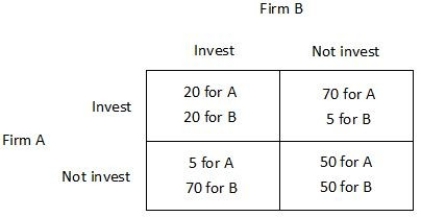 Firm A's dominant strategy is to ________, and Firm B's dominant strategy is to ________.
Firm A's dominant strategy is to ________, and Firm B's dominant strategy is to ________.
A)invest; not invest
B)not invest; invest
C)invest; invest
D)not invest; not invest
 Firm A's dominant strategy is to ________, and Firm B's dominant strategy is to ________.
Firm A's dominant strategy is to ________, and Firm B's dominant strategy is to ________.A)invest; not invest
B)not invest; invest
C)invest; invest
D)not invest; not invest

Unlock Deck
Unlock for access to all 150 flashcards in this deck.
Unlock Deck
k this deck
39
Consider the accompanying payoff matrix. 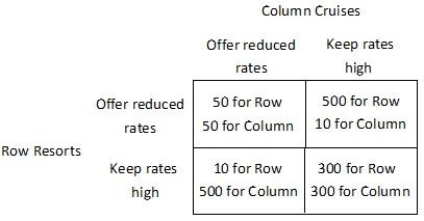 If Row Resorts keeps its rates high, then Column Cruises would receive the highest payoff if it:
If Row Resorts keeps its rates high, then Column Cruises would receive the highest payoff if it:
A)kept its rates high.
B)offered reduced rates.
C)agreed with Row Resorts to reduce their rates at exactly the same time.
D)choose either strategy because it will have the same payoff in either case.
 If Row Resorts keeps its rates high, then Column Cruises would receive the highest payoff if it:
If Row Resorts keeps its rates high, then Column Cruises would receive the highest payoff if it:A)kept its rates high.
B)offered reduced rates.
C)agreed with Row Resorts to reduce their rates at exactly the same time.
D)choose either strategy because it will have the same payoff in either case.

Unlock Deck
Unlock for access to all 150 flashcards in this deck.
Unlock Deck
k this deck
40
Consider the accompanying payoff matrix. 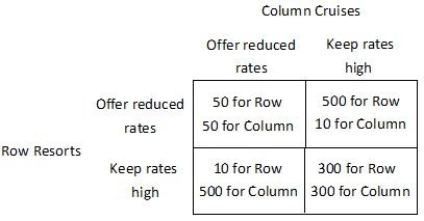 If Row Resorts offers reduced rates, then Column Cruises would receive the highest payoff if it:
If Row Resorts offers reduced rates, then Column Cruises would receive the highest payoff if it:
A)kept its rates high.
B)offered reduced its rates.
C)entered into a cartel with Row Resorts and agreed to jointly reduce rates.
D)choose either strategy because it will have the same payoff in either case.
 If Row Resorts offers reduced rates, then Column Cruises would receive the highest payoff if it:
If Row Resorts offers reduced rates, then Column Cruises would receive the highest payoff if it:A)kept its rates high.
B)offered reduced its rates.
C)entered into a cartel with Row Resorts and agreed to jointly reduce rates.
D)choose either strategy because it will have the same payoff in either case.

Unlock Deck
Unlock for access to all 150 flashcards in this deck.
Unlock Deck
k this deck
41
OPEC is an example of a:
A)monopsony.
B)cartel.
C)monopoly.
D)duopoly.
A)monopsony.
B)cartel.
C)monopoly.
D)duopoly.

Unlock Deck
Unlock for access to all 150 flashcards in this deck.
Unlock Deck
k this deck
42
Quick Buck and Pushy Sales produce and sell identical products and face zero marginal and average cost. Below is the market demand curve for their product. 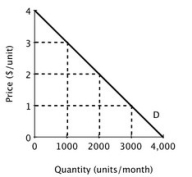 Suppose Quick Buck and Pushy Sales decide to collude and work together as a monopolist with each firm producing half the quantity demanded by the market at the monopoly price. If Quick Buck cheats by reducing its price to $1 while Pushy Sales continues to comply with the collusive agreement, then Quick Buck will sell ________ units and Pushy Sales will sell ________ units.
Suppose Quick Buck and Pushy Sales decide to collude and work together as a monopolist with each firm producing half the quantity demanded by the market at the monopoly price. If Quick Buck cheats by reducing its price to $1 while Pushy Sales continues to comply with the collusive agreement, then Quick Buck will sell ________ units and Pushy Sales will sell ________ units.
A)0; 3,000
B)3,000; 1,000
C)2,000; 1,000
D)3,000; 0
 Suppose Quick Buck and Pushy Sales decide to collude and work together as a monopolist with each firm producing half the quantity demanded by the market at the monopoly price. If Quick Buck cheats by reducing its price to $1 while Pushy Sales continues to comply with the collusive agreement, then Quick Buck will sell ________ units and Pushy Sales will sell ________ units.
Suppose Quick Buck and Pushy Sales decide to collude and work together as a monopolist with each firm producing half the quantity demanded by the market at the monopoly price. If Quick Buck cheats by reducing its price to $1 while Pushy Sales continues to comply with the collusive agreement, then Quick Buck will sell ________ units and Pushy Sales will sell ________ units.A)0; 3,000
B)3,000; 1,000
C)2,000; 1,000
D)3,000; 0

Unlock Deck
Unlock for access to all 150 flashcards in this deck.
Unlock Deck
k this deck
43
Cartel agreements are difficult to sustain because:
A)it's a dominant strategy for each cartel member to cheat on the cartel agreement.
B)the collective payoff to all the cartel members is lower when they all abide by the cartel agreement.
C)cartel members do not face the economic incentives inherent in a prisoner's dilemma.
D)it's usually easy to discover if one of the members has cheated.
A)it's a dominant strategy for each cartel member to cheat on the cartel agreement.
B)the collective payoff to all the cartel members is lower when they all abide by the cartel agreement.
C)cartel members do not face the economic incentives inherent in a prisoner's dilemma.
D)it's usually easy to discover if one of the members has cheated.

Unlock Deck
Unlock for access to all 150 flashcards in this deck.
Unlock Deck
k this deck
44
Most cartels cease to be effective because:
A)of strict enforcement of antitrust legislation.
B)of the incentive to cheat on the cartel agreement.
C)the dominant firm buys out the other firms.
D)consumers discover the cartel and buy from other firms instead.
A)of strict enforcement of antitrust legislation.
B)of the incentive to cheat on the cartel agreement.
C)the dominant firm buys out the other firms.
D)consumers discover the cartel and buy from other firms instead.

Unlock Deck
Unlock for access to all 150 flashcards in this deck.
Unlock Deck
k this deck
45
Suppose Firm A and Firm B are considering whether to invest in a new production technology. For each firm, the payoff to investing (given in thousands of dollars per day)depends upon whether the other firm invests, as shown in the payoff matrix below. 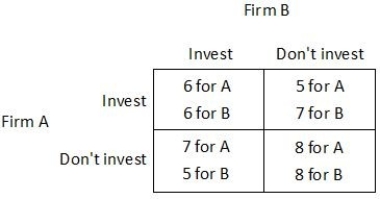 Which of the following statements is correct?
Which of the following statements is correct?
A)It cannot be determined whether Firm A has a dominated strategy.
B)"Don't invest" is a dominated strategy for Firm A.
C)Firm A does not have a dominated strategy.
D)"Invest" is a dominated strategy for Firm A.
 Which of the following statements is correct?
Which of the following statements is correct?A)It cannot be determined whether Firm A has a dominated strategy.
B)"Don't invest" is a dominated strategy for Firm A.
C)Firm A does not have a dominated strategy.
D)"Invest" is a dominated strategy for Firm A.

Unlock Deck
Unlock for access to all 150 flashcards in this deck.
Unlock Deck
k this deck
46
Suppose Firm A and Firm B are considering whether to invest in a new production technology. For each firm, the payoff to investing (given in thousands of dollars per day)depends upon whether the other firm invests, as shown in the payoff matrix below.
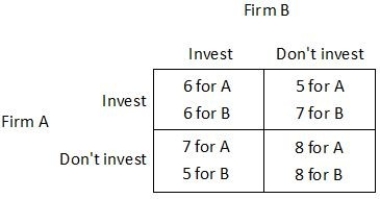 Is this game a prisoner's dilemma?
Is this game a prisoner's dilemma?
A)Yes.
B)No.
C)It cannot be determined.
D)Only when both Firm A and Firm B invest.
 Is this game a prisoner's dilemma?
Is this game a prisoner's dilemma?A)Yes.
B)No.
C)It cannot be determined.
D)Only when both Firm A and Firm B invest.

Unlock Deck
Unlock for access to all 150 flashcards in this deck.
Unlock Deck
k this deck
47
Suppose Acme and Mega produce and sell identical products and face zero marginal and average cost. Below is the market demand curve for their product. 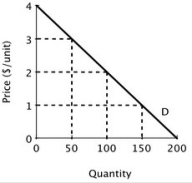 Suppose Acme and Mega decide to collude and work together as a monopolist with each firm producing half the quantity demanded by the market at the monopoly price. If Mega cheats on the agreement by reducing its price to $1 while Acme continues to comply with the collusive agreement, then Mega's economic profit will be ________.
Suppose Acme and Mega decide to collude and work together as a monopolist with each firm producing half the quantity demanded by the market at the monopoly price. If Mega cheats on the agreement by reducing its price to $1 while Acme continues to comply with the collusive agreement, then Mega's economic profit will be ________.
A)$75
B)$100
C)$150
D)$200
 Suppose Acme and Mega decide to collude and work together as a monopolist with each firm producing half the quantity demanded by the market at the monopoly price. If Mega cheats on the agreement by reducing its price to $1 while Acme continues to comply with the collusive agreement, then Mega's economic profit will be ________.
Suppose Acme and Mega decide to collude and work together as a monopolist with each firm producing half the quantity demanded by the market at the monopoly price. If Mega cheats on the agreement by reducing its price to $1 while Acme continues to comply with the collusive agreement, then Mega's economic profit will be ________.A)$75
B)$100
C)$150
D)$200

Unlock Deck
Unlock for access to all 150 flashcards in this deck.
Unlock Deck
k this deck
48
Quick Buck and Pushy Sales produce and sell identical products and face zero marginal and average cost. Below is the market demand curve for their product. 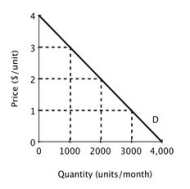 Suppose Quick Buck and Pushy Sales decide to collude and work together as a monopolist with each firm producing half the quantity demanded by the market at the monopoly price. If Quick Buck cheats by reducing its price to $1 while Pushy Sales continues to comply with the collusive agreement, then Quick Buck's economic profit will be ________.
Suppose Quick Buck and Pushy Sales decide to collude and work together as a monopolist with each firm producing half the quantity demanded by the market at the monopoly price. If Quick Buck cheats by reducing its price to $1 while Pushy Sales continues to comply with the collusive agreement, then Quick Buck's economic profit will be ________.
A)$6,000
B)$4,000
C)$2,000
D)$3,000
 Suppose Quick Buck and Pushy Sales decide to collude and work together as a monopolist with each firm producing half the quantity demanded by the market at the monopoly price. If Quick Buck cheats by reducing its price to $1 while Pushy Sales continues to comply with the collusive agreement, then Quick Buck's economic profit will be ________.
Suppose Quick Buck and Pushy Sales decide to collude and work together as a monopolist with each firm producing half the quantity demanded by the market at the monopoly price. If Quick Buck cheats by reducing its price to $1 while Pushy Sales continues to comply with the collusive agreement, then Quick Buck's economic profit will be ________.A)$6,000
B)$4,000
C)$2,000
D)$3,000

Unlock Deck
Unlock for access to all 150 flashcards in this deck.
Unlock Deck
k this deck
49
Suppose Firm A and Firm B are considering whether to invest in a new production technology. For each firm, the payoff to investing (given in thousands of dollars per day)depends upon whether the other firm invests, as shown in the payoff matrix below.
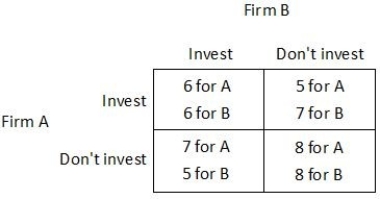
What is the Nash equilibrium of this game?
A)Firm A invests, and Firm B doesn't invest.
B)Firm A doesn't invest, and Firm B invests.
C)Firm A doesn't invest, and Firm B doesn't invest.
D)Firm A invests, and Firm B invests.

What is the Nash equilibrium of this game?
A)Firm A invests, and Firm B doesn't invest.
B)Firm A doesn't invest, and Firm B invests.
C)Firm A doesn't invest, and Firm B doesn't invest.
D)Firm A invests, and Firm B invests.

Unlock Deck
Unlock for access to all 150 flashcards in this deck.
Unlock Deck
k this deck
50
Quick Buck and Pushy Sales produce and sell identical products and face zero marginal and average cost. Below is the market demand curve for their product. 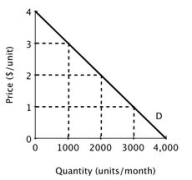 Suppose Quick Buck and Pushy Sales decide to collude and work together as a monopolist with each firm producing half the quantity demanded by the market at the monopoly price. If Quick Buck cheats by reducing its price to $1 and Pushy Sales matches the price cut, then if consumers are evenly split between the two firms, what will be Quick Buck's economic profit?
Suppose Quick Buck and Pushy Sales decide to collude and work together as a monopolist with each firm producing half the quantity demanded by the market at the monopoly price. If Quick Buck cheats by reducing its price to $1 and Pushy Sales matches the price cut, then if consumers are evenly split between the two firms, what will be Quick Buck's economic profit?
A)$1,000
B)$1,500
C)$2,000
D)$3,000
 Suppose Quick Buck and Pushy Sales decide to collude and work together as a monopolist with each firm producing half the quantity demanded by the market at the monopoly price. If Quick Buck cheats by reducing its price to $1 and Pushy Sales matches the price cut, then if consumers are evenly split between the two firms, what will be Quick Buck's economic profit?
Suppose Quick Buck and Pushy Sales decide to collude and work together as a monopolist with each firm producing half the quantity demanded by the market at the monopoly price. If Quick Buck cheats by reducing its price to $1 and Pushy Sales matches the price cut, then if consumers are evenly split between the two firms, what will be Quick Buck's economic profit?A)$1,000
B)$1,500
C)$2,000
D)$3,000

Unlock Deck
Unlock for access to all 150 flashcards in this deck.
Unlock Deck
k this deck
51
Suppose Acme and Mega produce and sell identical products and face zero marginal and average cost. Below is the market demand curve for their product. 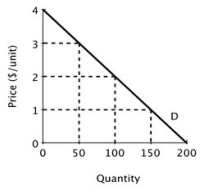 Suppose Acme and Mega decide to collude and work together as a monopolist with each firm producing half the quantity demanded by the market at the monopoly price. If Mega cheats on the agreement by reducing its price to $1 while Acme continues to comply with the collusive agreement, then Mega will then sell ________ units and Acme will sell ________ units.
Suppose Acme and Mega decide to collude and work together as a monopolist with each firm producing half the quantity demanded by the market at the monopoly price. If Mega cheats on the agreement by reducing its price to $1 while Acme continues to comply with the collusive agreement, then Mega will then sell ________ units and Acme will sell ________ units.
A)150; 50
B)100; 50
C)150; 0
D)100; 0
 Suppose Acme and Mega decide to collude and work together as a monopolist with each firm producing half the quantity demanded by the market at the monopoly price. If Mega cheats on the agreement by reducing its price to $1 while Acme continues to comply with the collusive agreement, then Mega will then sell ________ units and Acme will sell ________ units.
Suppose Acme and Mega decide to collude and work together as a monopolist with each firm producing half the quantity demanded by the market at the monopoly price. If Mega cheats on the agreement by reducing its price to $1 while Acme continues to comply with the collusive agreement, then Mega will then sell ________ units and Acme will sell ________ units.A)150; 50
B)100; 50
C)150; 0
D)100; 0

Unlock Deck
Unlock for access to all 150 flashcards in this deck.
Unlock Deck
k this deck
52
The payoff matrix below shows the daily profit for two firms, Row Restaurant and Column Cafe, for two different strategies, publishing coupons in the student paper and not publishing coupons in the student paper.
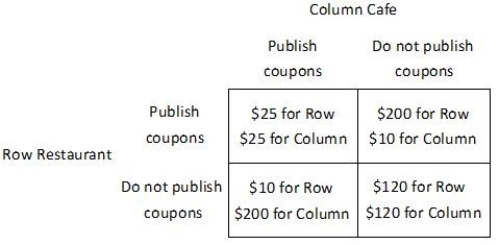 If Column Cafe publishes coupons and Row Restaurant does not, then Row Restaurant will earn ________, and Column Cafe will earn ________.
If Column Cafe publishes coupons and Row Restaurant does not, then Row Restaurant will earn ________, and Column Cafe will earn ________.
A)$10; $200
B)$25; $25
C)$200; $10
D)$120; $120
 If Column Cafe publishes coupons and Row Restaurant does not, then Row Restaurant will earn ________, and Column Cafe will earn ________.
If Column Cafe publishes coupons and Row Restaurant does not, then Row Restaurant will earn ________, and Column Cafe will earn ________.A)$10; $200
B)$25; $25
C)$200; $10
D)$120; $120

Unlock Deck
Unlock for access to all 150 flashcards in this deck.
Unlock Deck
k this deck
53
Suppose Acme and Mega produce and sell identical products and face zero marginal and average cost. Below is the market demand curve for their product. 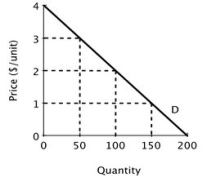 For a monopolist facing this demand curve, the profit-maximizing quantity is ________ and the profit-maximizing price is ________.
For a monopolist facing this demand curve, the profit-maximizing quantity is ________ and the profit-maximizing price is ________.
A)50; $2
B)100; $2
C)50; $3
D)100; $1
 For a monopolist facing this demand curve, the profit-maximizing quantity is ________ and the profit-maximizing price is ________.
For a monopolist facing this demand curve, the profit-maximizing quantity is ________ and the profit-maximizing price is ________.A)50; $2
B)100; $2
C)50; $3
D)100; $1

Unlock Deck
Unlock for access to all 150 flashcards in this deck.
Unlock Deck
k this deck
54
Suppose Acme and Mega produce and sell identical products and face zero marginal and average cost. Below is the market demand curve for their product. 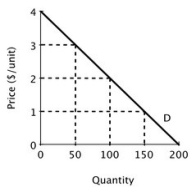 Suppose Acme and Mega decide to collude and work together as a monopolist with each firm producing half the quantity demanded by the market at the monopoly price. If Mega cheats on the agreement by reducing its price to $1 and Acme matches the price cut, then if consumers are evenly split between the two firms, Acme's economic profit will be ________.
Suppose Acme and Mega decide to collude and work together as a monopolist with each firm producing half the quantity demanded by the market at the monopoly price. If Mega cheats on the agreement by reducing its price to $1 and Acme matches the price cut, then if consumers are evenly split between the two firms, Acme's economic profit will be ________.
A)$75
B)$100
C)$150
D)$200
 Suppose Acme and Mega decide to collude and work together as a monopolist with each firm producing half the quantity demanded by the market at the monopoly price. If Mega cheats on the agreement by reducing its price to $1 and Acme matches the price cut, then if consumers are evenly split between the two firms, Acme's economic profit will be ________.
Suppose Acme and Mega decide to collude and work together as a monopolist with each firm producing half the quantity demanded by the market at the monopoly price. If Mega cheats on the agreement by reducing its price to $1 and Acme matches the price cut, then if consumers are evenly split between the two firms, Acme's economic profit will be ________.A)$75
B)$100
C)$150
D)$200

Unlock Deck
Unlock for access to all 150 flashcards in this deck.
Unlock Deck
k this deck
55
Suppose Acme and Mega produce and sell identical products and face zero marginal and average cost. Below is the market demand curve for their product. 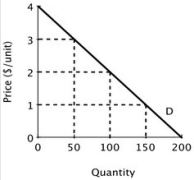 If Acme and Mega decide to collude and work together as a monopolist with each firm producing half the quantity demanded by the market at the monopoly price, then what will be Mega's economic profit?
If Acme and Mega decide to collude and work together as a monopolist with each firm producing half the quantity demanded by the market at the monopoly price, then what will be Mega's economic profit?
A)$0
B)$50
C)$100
D)$150
 If Acme and Mega decide to collude and work together as a monopolist with each firm producing half the quantity demanded by the market at the monopoly price, then what will be Mega's economic profit?
If Acme and Mega decide to collude and work together as a monopolist with each firm producing half the quantity demanded by the market at the monopoly price, then what will be Mega's economic profit?A)$0
B)$50
C)$100
D)$150

Unlock Deck
Unlock for access to all 150 flashcards in this deck.
Unlock Deck
k this deck
56
Quick Buck and Pushy Sales produce and sell identical products and face zero marginal and average cost. Below is the market demand curve for their product. 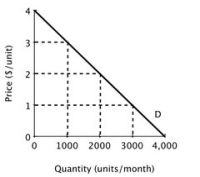 If Quick Buck and Pushy Sales decide to collude and work together as a monopolist, then together they should produce ________ units per month and charge ________ per unit.
If Quick Buck and Pushy Sales decide to collude and work together as a monopolist, then together they should produce ________ units per month and charge ________ per unit.
A)3,000; $1
B)4,000; $2
C)2,000; $2
D)1,000; $3
 If Quick Buck and Pushy Sales decide to collude and work together as a monopolist, then together they should produce ________ units per month and charge ________ per unit.
If Quick Buck and Pushy Sales decide to collude and work together as a monopolist, then together they should produce ________ units per month and charge ________ per unit.A)3,000; $1
B)4,000; $2
C)2,000; $2
D)1,000; $3

Unlock Deck
Unlock for access to all 150 flashcards in this deck.
Unlock Deck
k this deck
57
The payoff matrix below shows the daily profit for two firms, Row Restaurant and Column Cafe, for two different strategies, publishing coupons in the student paper and not publishing coupons in the student paper.
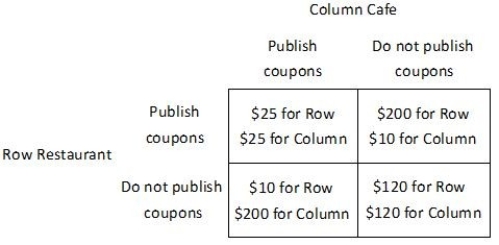 The payoffs of this game are such that:
The payoffs of this game are such that:
A)if Row Restaurant expects Column Cafe to choose its dominant strategy, then Row Restaurant should choose its dominated strategy.
B)profit at each firm is higher when they both follow their dominant strategy than when they both follow their dominated strategy.
C)both firms would benefit from a law that made publishing coupons illegal.
D)an agreement not to publish coupons would be easy to maintain because neither firm has an incentive to defect.
 The payoffs of this game are such that:
The payoffs of this game are such that:A)if Row Restaurant expects Column Cafe to choose its dominant strategy, then Row Restaurant should choose its dominated strategy.
B)profit at each firm is higher when they both follow their dominant strategy than when they both follow their dominated strategy.
C)both firms would benefit from a law that made publishing coupons illegal.
D)an agreement not to publish coupons would be easy to maintain because neither firm has an incentive to defect.

Unlock Deck
Unlock for access to all 150 flashcards in this deck.
Unlock Deck
k this deck
58
The payoff matrix below shows the daily profit for two firms, Row Restaurant and Column Cafe, for two different strategies, publishing coupons in the student paper and not publishing coupons in the student paper.
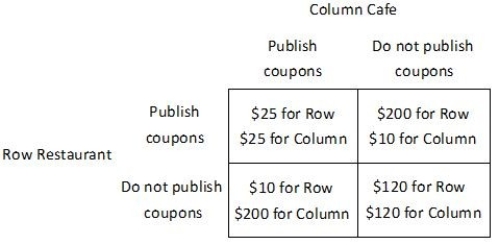 If Row Restaurant publishes coupons, Column Cafe would earn the highest profit if it:
If Row Restaurant publishes coupons, Column Cafe would earn the highest profit if it:
A)did not publish coupons.
B)also published coupons.
C)chooses either strategy because Column Cafe will have the same profit in either case.
D)only offered coupons half of the time.
 If Row Restaurant publishes coupons, Column Cafe would earn the highest profit if it:
If Row Restaurant publishes coupons, Column Cafe would earn the highest profit if it:A)did not publish coupons.
B)also published coupons.
C)chooses either strategy because Column Cafe will have the same profit in either case.
D)only offered coupons half of the time.

Unlock Deck
Unlock for access to all 150 flashcards in this deck.
Unlock Deck
k this deck
59
A coalition of firms who agree to restrict output for the purpose of earning an economic profit is called a(n):
A)pure monopoly.
B)oligopoly.
C)cartel.
D)duopoly.
A)pure monopoly.
B)oligopoly.
C)cartel.
D)duopoly.

Unlock Deck
Unlock for access to all 150 flashcards in this deck.
Unlock Deck
k this deck
60
Quick Buck and Pushy Sales produce and sell identical products and face zero marginal and average cost. Below is the market demand curve for their product. 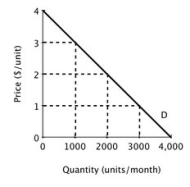 If Quick Buck and Pushy Sales decide to collude and work together as a monopolist with each firm producing half the quantity demanded by the market at the monopoly price, then what will be Quick Buck's economic profit?
If Quick Buck and Pushy Sales decide to collude and work together as a monopolist with each firm producing half the quantity demanded by the market at the monopoly price, then what will be Quick Buck's economic profit?
A)$1,000
B)$2,000
C)$3,000
D)$4,000
 If Quick Buck and Pushy Sales decide to collude and work together as a monopolist with each firm producing half the quantity demanded by the market at the monopoly price, then what will be Quick Buck's economic profit?
If Quick Buck and Pushy Sales decide to collude and work together as a monopolist with each firm producing half the quantity demanded by the market at the monopoly price, then what will be Quick Buck's economic profit?A)$1,000
B)$2,000
C)$3,000
D)$4,000

Unlock Deck
Unlock for access to all 150 flashcards in this deck.
Unlock Deck
k this deck
61
Before it became illegal, cigarette manufacturers once relied heavily on TV advertising. According to the textbook, when the government banned TV advertising, the cigarette manufacturers:
A)supported the ban due to their concern over health effects of smoking.
B)thought their First Amendment rights were being violated.
C)were made worse off because the ban significantly reduced cigarette sales.
D)benefited because the decision about whether to advertise on TV was a prisoner's dilemma.
A)supported the ban due to their concern over health effects of smoking.
B)thought their First Amendment rights were being violated.
C)were made worse off because the ban significantly reduced cigarette sales.
D)benefited because the decision about whether to advertise on TV was a prisoner's dilemma.

Unlock Deck
Unlock for access to all 150 flashcards in this deck.
Unlock Deck
k this deck
62
Suppose Grandis and Immanis are the only two companies that sell the product whose market demand curve is shown in the accompanying figure. For both companies, both average total cost and marginal cost are constant and equal to $2 (ATC = MC = $2). 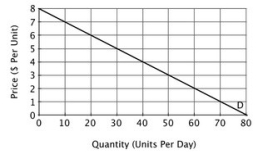 Suppose Grandis and Immanis agree to collude by both charging the price a monopolist would charge and each producing half of the monopolist's profit-maximizing level of output. If they both abide by this agreement, then each will earn a profit of ________ per day.
Suppose Grandis and Immanis agree to collude by both charging the price a monopolist would charge and each producing half of the monopolist's profit-maximizing level of output. If they both abide by this agreement, then each will earn a profit of ________ per day.
A)$150
B)$75
C)$90
D)$45
 Suppose Grandis and Immanis agree to collude by both charging the price a monopolist would charge and each producing half of the monopolist's profit-maximizing level of output. If they both abide by this agreement, then each will earn a profit of ________ per day.
Suppose Grandis and Immanis agree to collude by both charging the price a monopolist would charge and each producing half of the monopolist's profit-maximizing level of output. If they both abide by this agreement, then each will earn a profit of ________ per day.A)$150
B)$75
C)$90
D)$45

Unlock Deck
Unlock for access to all 150 flashcards in this deck.
Unlock Deck
k this deck
63
The market for bagels contains two firms: BagelWorld (BW)and Bagels'R'Us (BRU). The owners of the two firms decide to fix the price of bagels. The table below shows how each firm's profit (in dollars)depends on whether they abide by the agreement or cheat on the agreement.
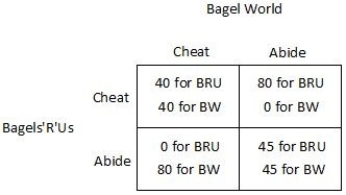 Suppose the game above is repeated every day, and both firms adopt the following strategy: cooperate on the first day, then if the other firm cheats, cheat the next day, and if the other firm abides, abide the next day. This type of strategy is likely to increase the probability that:
Suppose the game above is repeated every day, and both firms adopt the following strategy: cooperate on the first day, then if the other firm cheats, cheat the next day, and if the other firm abides, abide the next day. This type of strategy is likely to increase the probability that:
A)both firms cheat.
B)Bagel World cheats.
C)both firms abide.
D)Bagels'R'Us cheats.
 Suppose the game above is repeated every day, and both firms adopt the following strategy: cooperate on the first day, then if the other firm cheats, cheat the next day, and if the other firm abides, abide the next day. This type of strategy is likely to increase the probability that:
Suppose the game above is repeated every day, and both firms adopt the following strategy: cooperate on the first day, then if the other firm cheats, cheat the next day, and if the other firm abides, abide the next day. This type of strategy is likely to increase the probability that:A)both firms cheat.
B)Bagel World cheats.
C)both firms abide.
D)Bagels'R'Us cheats.

Unlock Deck
Unlock for access to all 150 flashcards in this deck.
Unlock Deck
k this deck
64
A strategy that limits defection in a repeated prisoner's dilemma game is:
A)a Nash equilibrium.
B)a tit-for-tat strategy.
C)a cartel.
D)an ultimatum bargaining game.
A)a Nash equilibrium.
B)a tit-for-tat strategy.
C)a cartel.
D)an ultimatum bargaining game.

Unlock Deck
Unlock for access to all 150 flashcards in this deck.
Unlock Deck
k this deck
65
The market for bagels contains two firms: BagelWorld (BW)and Bagels'R'Us (BRU). The owners of the two firms decide to fix the price of bagels. The table below shows how each firm's profit (in dollars)depends on whether they abide by the agreement or cheat on the agreement. 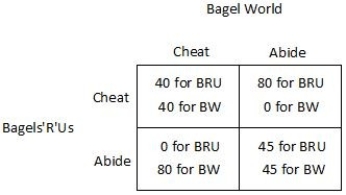 In the Nash equilibrium of this game:
In the Nash equilibrium of this game:
A)both firms abide by the agreement
B)Bagel World abides and Bagels'R'Us cheats
C)both firms cheat on the agreement
D)Bagel World cheats and Bagels 'R' Us abides
 In the Nash equilibrium of this game:
In the Nash equilibrium of this game:A)both firms abide by the agreement
B)Bagel World abides and Bagels'R'Us cheats
C)both firms cheat on the agreement
D)Bagel World cheats and Bagels 'R' Us abides

Unlock Deck
Unlock for access to all 150 flashcards in this deck.
Unlock Deck
k this deck
66
According to the text, everyone shouts at a party in order to be heard. If instead everyone spoke at a normal volume people would still be heard, but people continue to shout because:
A)shouting is a dominated strategy.
B)shouting is a dominant strategy.
C)shouting can be sustained using a tit-for-tat strategy.
D)the payoff matrix is unknown to the people at a party.
A)shouting is a dominated strategy.
B)shouting is a dominant strategy.
C)shouting can be sustained using a tit-for-tat strategy.
D)the payoff matrix is unknown to the people at a party.

Unlock Deck
Unlock for access to all 150 flashcards in this deck.
Unlock Deck
k this deck
67
A decision tree is used when modeling:
A)any type of game.
B)simultaneous decisions.
C)a prisoner's dilemma.
D)games in which timing matters.
A)any type of game.
B)simultaneous decisions.
C)a prisoner's dilemma.
D)games in which timing matters.

Unlock Deck
Unlock for access to all 150 flashcards in this deck.
Unlock Deck
k this deck
68
Suppose Grandis and Immanis are the only two companies that sell the product whose market demand curve is shown in the accompanying figure. For both companies, both average total cost and marginal cost are constant and equal to $2 (ATC = MC = $2). 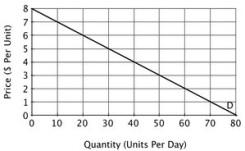 Suppose Grandis and Immanis agree to collude by both charging the price a monopolist would charge and each producing half of the monopolist's profit-maximizing level of output. Grandis, however, decides to cheat on the collusive agreement. If Grandis charges $1 less than the monopoly price while Immanis continues to charge the monopoly price, then Grandis will earn a profit of ________ per day.
Suppose Grandis and Immanis agree to collude by both charging the price a monopolist would charge and each producing half of the monopolist's profit-maximizing level of output. Grandis, however, decides to cheat on the collusive agreement. If Grandis charges $1 less than the monopoly price while Immanis continues to charge the monopoly price, then Grandis will earn a profit of ________ per day.
A)$160
B)$80
C)$40
D)$20
 Suppose Grandis and Immanis agree to collude by both charging the price a monopolist would charge and each producing half of the monopolist's profit-maximizing level of output. Grandis, however, decides to cheat on the collusive agreement. If Grandis charges $1 less than the monopoly price while Immanis continues to charge the monopoly price, then Grandis will earn a profit of ________ per day.
Suppose Grandis and Immanis agree to collude by both charging the price a monopolist would charge and each producing half of the monopolist's profit-maximizing level of output. Grandis, however, decides to cheat on the collusive agreement. If Grandis charges $1 less than the monopoly price while Immanis continues to charge the monopoly price, then Grandis will earn a profit of ________ per day.A)$160
B)$80
C)$40
D)$20

Unlock Deck
Unlock for access to all 150 flashcards in this deck.
Unlock Deck
k this deck
69
In a repeated prisoner's dilemma, players:
A)never learn to play their dominant strategies.
B)can sustain cooperation by employing a tit-for-tat strategy.
C)can sustain cooperation by playing their dominant strategy.
D)always play their dominant strategy.
A)never learn to play their dominant strategies.
B)can sustain cooperation by employing a tit-for-tat strategy.
C)can sustain cooperation by playing their dominant strategy.
D)always play their dominant strategy.

Unlock Deck
Unlock for access to all 150 flashcards in this deck.
Unlock Deck
k this deck
70
A ________ describes the possible moves in a game in sequence and lists the payoffs to each possible combination of moves.
A)decision tree
B)payoff matrix
C)game graph
D)multi-period game
A)decision tree
B)payoff matrix
C)game graph
D)multi-period game

Unlock Deck
Unlock for access to all 150 flashcards in this deck.
Unlock Deck
k this deck
71
The table below shows how the payoffs to two political candidates depend on whether the candidates run a positive or negative campaign. The payoffs are given in terms of the percentage change in the number of votes received. 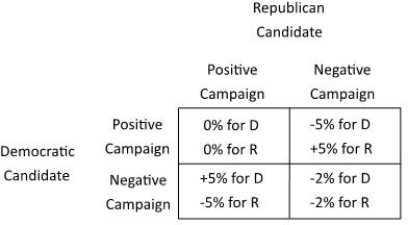 Running a negative campaign is ________ for the ________ candidate.
Running a negative campaign is ________ for the ________ candidate.
A)a dominated strategy; Democratic
B)a dominated strategy; Republican
C)a dominant strategy; Democratic
D)neither a dominant nor dominated strategy; Republican
 Running a negative campaign is ________ for the ________ candidate.
Running a negative campaign is ________ for the ________ candidate.A)a dominated strategy; Democratic
B)a dominated strategy; Republican
C)a dominant strategy; Democratic
D)neither a dominant nor dominated strategy; Republican

Unlock Deck
Unlock for access to all 150 flashcards in this deck.
Unlock Deck
k this deck
72
The table below shows how the payoffs to two political candidates depend on whether the candidates run a positive or negative campaign. The payoffs are given in terms of the percentage change in the number of votes received.
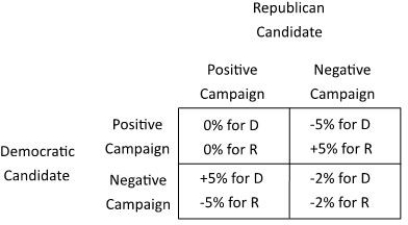 In the Nash equilibrium of this game:
In the Nash equilibrium of this game:
A)both candidates run positive campaigns.
B)one candidate runs a positive campaign, and the other runs a negative campaign.
C)as long as one party runs a positive campaign, the other does too.
D)both candidates run negative campaigns.
 In the Nash equilibrium of this game:
In the Nash equilibrium of this game:A)both candidates run positive campaigns.
B)one candidate runs a positive campaign, and the other runs a negative campaign.
C)as long as one party runs a positive campaign, the other does too.
D)both candidates run negative campaigns.

Unlock Deck
Unlock for access to all 150 flashcards in this deck.
Unlock Deck
k this deck
73
The market for bagels contains two firms: BagelWorld (BW)and Bagels'R'Us (BRU). The owners of the two firms decide to fix the price of bagels. The table below shows how each firm's profit (in dollars)depends on whether they abide by the agreement or cheat on the agreement.
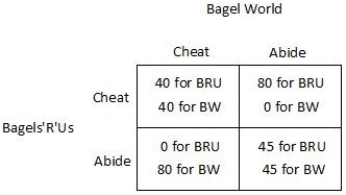 For Bagel World, ________ is a ________.
For Bagel World, ________ is a ________.
A)abiding by the agreement; dominant strategy
B)cheating on the agreement; dominated strategy
C)cheating on the agreement; dominant strategy
D)abiding by the agreement; dominant strategy when Bagels'R'Us also abides
 For Bagel World, ________ is a ________.
For Bagel World, ________ is a ________.A)abiding by the agreement; dominant strategy
B)cheating on the agreement; dominated strategy
C)cheating on the agreement; dominant strategy
D)abiding by the agreement; dominant strategy when Bagels'R'Us also abides

Unlock Deck
Unlock for access to all 150 flashcards in this deck.
Unlock Deck
k this deck
74
The market for bagels contains two firms: BagelWorld (BW)and Bagels'R'Us (BRU). The owners of the two firms decide to fix the price of bagels. The table below shows how each firm's profit (in dollars)depends on whether they abide by the agreement or cheat on the agreement.
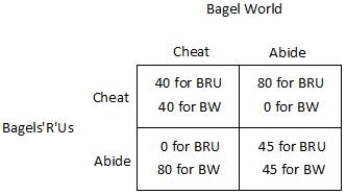 For Bagels'R'Us, ________ is a ________.
For Bagels'R'Us, ________ is a ________.
A)abiding by the agreement; dominant strategy
B)cheating on the agreement; dominated strategy
C)cheating on the agreement; dominant strategy
D)abiding by the agreement; dominant strategy when Bagel World also abides
 For Bagels'R'Us, ________ is a ________.
For Bagels'R'Us, ________ is a ________.A)abiding by the agreement; dominant strategy
B)cheating on the agreement; dominated strategy
C)cheating on the agreement; dominant strategy
D)abiding by the agreement; dominant strategy when Bagel World also abides

Unlock Deck
Unlock for access to all 150 flashcards in this deck.
Unlock Deck
k this deck
75
The market for bagels contains two firms: BagelWorld (BW)and Bagels'R'Us (BRU). The owners of the two firms decide to fix the price of bagels. The table below shows how each firm's profit (in dollars)depends on whether they abide by the agreement or cheat on the agreement.
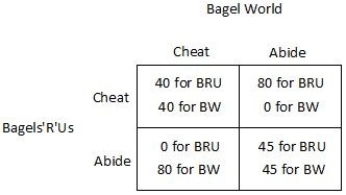 Suppose the game above is repeated every day, and both firms adopt the following strategy: cooperate on the first day, then if the other firm cheats, cheat the next day, and if the other firm abides, abide the next day. This type of strategy is known as:
Suppose the game above is repeated every day, and both firms adopt the following strategy: cooperate on the first day, then if the other firm cheats, cheat the next day, and if the other firm abides, abide the next day. This type of strategy is known as:
A)a prisoner's dilemma.
B)the cartel solution.
C)a tit-for-tat strategy.
D)the golden rule.
 Suppose the game above is repeated every day, and both firms adopt the following strategy: cooperate on the first day, then if the other firm cheats, cheat the next day, and if the other firm abides, abide the next day. This type of strategy is known as:
Suppose the game above is repeated every day, and both firms adopt the following strategy: cooperate on the first day, then if the other firm cheats, cheat the next day, and if the other firm abides, abide the next day. This type of strategy is known as:A)a prisoner's dilemma.
B)the cartel solution.
C)a tit-for-tat strategy.
D)the golden rule.

Unlock Deck
Unlock for access to all 150 flashcards in this deck.
Unlock Deck
k this deck
76
In tit-for-tat, if your partner ________ in your first interaction, then you will ________ in your next interaction.
A)defects; cooperate
B)defects; defect
C)cooperates; defect
D)defects; refuse to play
A)defects; cooperate
B)defects; defect
C)cooperates; defect
D)defects; refuse to play

Unlock Deck
Unlock for access to all 150 flashcards in this deck.
Unlock Deck
k this deck
77
The market for bagels contains two firms: BagelWorld (BW)and Bagels'R'Us (BRU). The owners of the two firms decide to fix the price of bagels. The table below shows how each firm's profit (in dollars)depends on whether they abide by the agreement or cheat on the agreement.
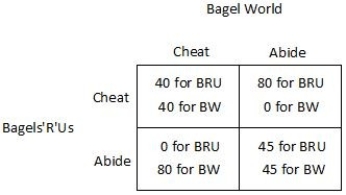 Is this game a prisoner's dilemma?
Is this game a prisoner's dilemma?
A)No, because cheating yields the highest payoff for both firms
B)Yes, because if both firms played their dominated strategy, they each would earn a higher payoff than when they both play their dominant strategy.
C)Yes, because if both firms played their dominant strategy, they each would earn a higher payoff than when they both play their dominated strategy.
D)No, because neither firm has a dominant strategy
 Is this game a prisoner's dilemma?
Is this game a prisoner's dilemma?A)No, because cheating yields the highest payoff for both firms
B)Yes, because if both firms played their dominated strategy, they each would earn a higher payoff than when they both play their dominant strategy.
C)Yes, because if both firms played their dominant strategy, they each would earn a higher payoff than when they both play their dominated strategy.
D)No, because neither firm has a dominant strategy

Unlock Deck
Unlock for access to all 150 flashcards in this deck.
Unlock Deck
k this deck
78
The table below shows how the payoffs to two political candidates depend on whether the candidates run a positive or negative campaign. The payoffs are given in terms of the percentage change in the number of votes received.
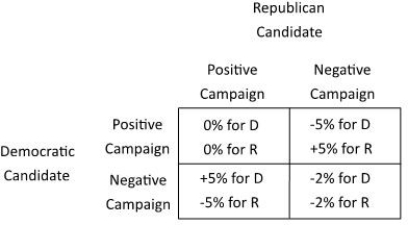 Suppose that the Republican candidate tells the Democratic candidate that he intends to run a positive campaign. The likely result is that:
Suppose that the Republican candidate tells the Democratic candidate that he intends to run a positive campaign. The likely result is that:
A)both candidates will run a positive campaign.
B)the Republican candidate will run a positive campaign, and the Democratic candidate will run a negative campaign.
C)both candidates will run a negative campaign.
D)the Republican candidate will run a negative campaign, and the Democratic candidate will run a positive campaign.
 Suppose that the Republican candidate tells the Democratic candidate that he intends to run a positive campaign. The likely result is that:
Suppose that the Republican candidate tells the Democratic candidate that he intends to run a positive campaign. The likely result is that:A)both candidates will run a positive campaign.
B)the Republican candidate will run a positive campaign, and the Democratic candidate will run a negative campaign.
C)both candidates will run a negative campaign.
D)the Republican candidate will run a negative campaign, and the Democratic candidate will run a positive campaign.

Unlock Deck
Unlock for access to all 150 flashcards in this deck.
Unlock Deck
k this deck
79
The tit-for-tat strategy only works for a prisoner's dilemma that:
A)has only one Nash equilibrium.
B)is played only one time.
C)does not have a Nash equilibrium.
D)is repeated.
A)has only one Nash equilibrium.
B)is played only one time.
C)does not have a Nash equilibrium.
D)is repeated.

Unlock Deck
Unlock for access to all 150 flashcards in this deck.
Unlock Deck
k this deck
80
Suppose the market for bottled water is served by two oligopolists. If they reach an agreement to restrict production and charge a price above marginal cost, then:
A)they will earn a larger profit than a monopolist would have earned.
B)they will charge a higher price than a monopolist would have charged.
C)their agreement is likely to eventually collapse.
D)neither firm will have an incentive to cheat on the agreement since it benefits them both.
A)they will earn a larger profit than a monopolist would have earned.
B)they will charge a higher price than a monopolist would have charged.
C)their agreement is likely to eventually collapse.
D)neither firm will have an incentive to cheat on the agreement since it benefits them both.

Unlock Deck
Unlock for access to all 150 flashcards in this deck.
Unlock Deck
k this deck



